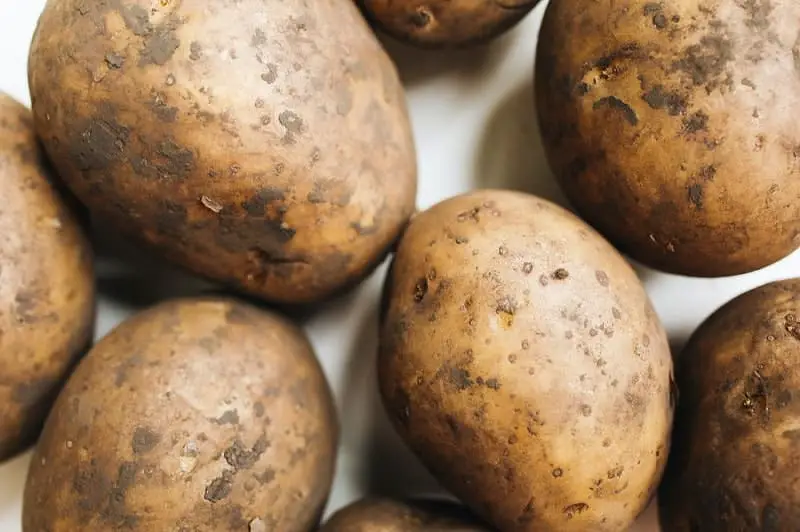Photo by Polina Tankilevitch
Dogs are technically omnivorous animals, which means that they can digest both plant and animal material. Their bodies need to obtain the majority of their calories and nutrients from meat sources, but they are able to supplement their diet with plant-based foods like fruits and vegetables. So, can dogs eat potato skins?
The quick answer is yes, dogs can eat potato skins, but there are a few things to keep in mind.
Are Potato Skins Good For Dogs?
It’s important to understand that the ancestors of modern day dogs did not rely on potatoes or other root vegetables in the wild to survive. In fact, potatoes are a relatively new food source for many humans and were only introduced to Europe in the 16th century.
That being said, potato skins can be a good source of fiber and carbohydrates for dogs. They also contain vitamins A and C, as well as potassium and iron. However, potato skins should only be given to dogs if the meet the right criteria.
Never give your dog raw potato skins
Raw potato skins are tough for both humans and dogs to digest as they contain high levels of starch and solanine. Solanine is found in nightshade plants like potatoes, tomatoes, and eggplants. It’s what gives these vegetables their bitter taste.
While a small amount of solanine is not likely to harm your dog, it can cause gastrointestinal upset and even central nervous system depression if consumed in large quantities. Therefore, it’s best to avoid giving your dog raw potato skins altogether.
Common signs of solanine poisoning in dogs include:
- Gastrointestinal upset (vomiting, diarrhea)
- Lethargy
- Weakness
- Fever
- Breathing difficulties
- Muscle tremors
- Seizures
If you suspect your dog has eaten raw potato skins and is displaying any of these symptoms, it’s important to seek veterinary care immediately.
Only give your dog cooked potato skins
If you want to give your dog potato skins, always cook them first. Cooking helps to break down the solanine so that it’s easier for your dog to digest. These can cooked by boiling or baking.
Do not give your dogs seasoned potato skins
While cooked potato skins are safe for dogs to eat, you should avoid giving them any that are seasoned. This means no salt, pepper, or other spices that could potentially upset your dog’s stomach. In addition, avoid giving your dog potato skins that have been fried or are covered in cheese or other toppings as these could potentially be harmful.
Limit the amount of potato skins you give your dog
Even if you follow all of the above guidelines, it’s still important to limit the amount of potato skins you give your dog. This is because they are not a natural part of a dog’s diet and too much could lead to gastrointestinal upset. Like humans, every dog is different and will have different tolerances. Start by giving your dog a small piece of potato skin and see how they react after 1-2 days before giving them more.
Additionally, potato skins have small amounts of oxalates, which are known to cause kidney problems in dogs. Small amounts of oxalates do not cause problems for healthy dogs, but it’s still important to limit the amount of potato skins you give your dog. Especially if your dog is older or has kidney health concerns.
What are Oxalates?
Oxalates are compounds found in a variety of fruits, vegetables, and nuts. They are what give these foods their sour or astringent taste. When consumed in small amounts, oxalates pose no threat to human health. However, when consumed in large quantities, they can cause kidney stones or other problems.
In dogs, oxalates can bind to calcium in the blood and create crystals that can damage the kidneys. This is more likely to occur in dogs who already have kidney problems or are older.
Can potato skins be used for dog training?
Cooked potato skins can be used as a training treat for dogs, especially for dogs who are food motivated. They also offer a nice change of pace for dogs who become used to their normal diet. It’s a good idea to mix in other types of foods as well so that your dog doesn’t get bored with their treats and to provide variety to their diet when training.
Are potato skins good for dogs with allergies?
If your dog has allergies, potato skins can be a good way to add some variety to their diet. They are also a hypoallergenic food, which means they are less likely to cause an allergic reaction in dogs. However, as with any new food, it’s always best to introduce it slowly to see how your dog reacts.
Are potatoes better for dogs than potato skins?
Potato skins contain higher levels of oxalates than the interior of potatoes, so potato skins are generally not as good for dogs as the rest of the potato. It’s still fine to give your dog potato skins in moderation, but it’s best to limit the amount you give them and to cook them before feeding.
Can dogs eat skins from old potatoes?
You should not give your dog old potato skins as they may contain higher levels of solanine, which can be toxic to dogs when compared to fresh potatoes. Even if you cook the potatoes properly, it’s still best to avoid giving your dog old potatoes.
Do sweet potatoes have the same benefits as regular potatoes?
Sweet potatoes are a good alternative to regular potatoes for dogs. They contain similar nutrients but are lower in oxalates, making them a better choice for dogs with kidney problems. It’s also better to just give your dog the flesh from the sweet potatoes instead of the skins, as they are difficult for dogs to digest. As with all new foods, introduce sweet potatoes to your dog slowly to see how they react.

